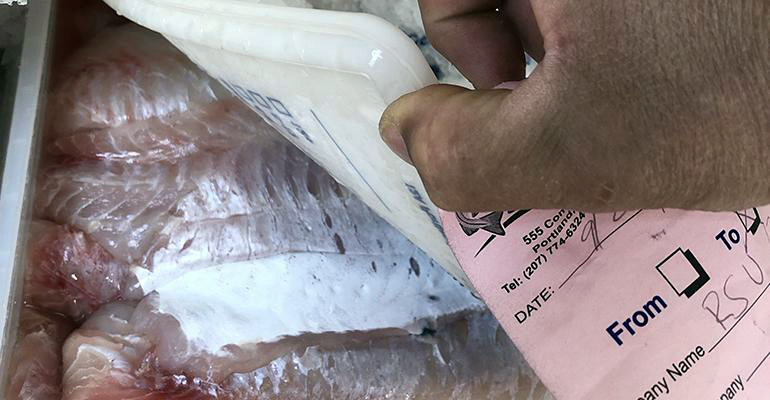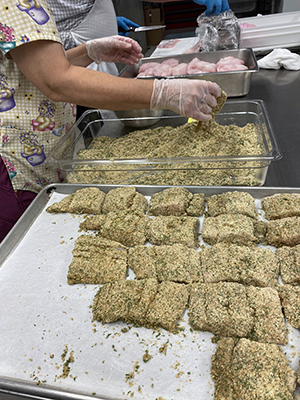
RSU 12 Nutrition Director Mike Flynn opens a container of fish from the Fishermen Feeding Mainers program. The program allows the district to serve fresh, local seafood to students. (Photo courtesy Food Management)
(Editor’s note: The Lincoln County News is reprinting this article with permission from the website Food Management.)
The standard processed fish sticks have gotten an upgrade at Sheepscot Valley Regional School Unit 12 in Somerville. These days, students are eating fish caught locally by Maine fishermen.
That’s thanks to Fishermen Feeding Mainers, a program run by the nonprofit Maine Coast Fishermen’s Association. “Seafood is, and has always been, a part of Maine’s economy and culture,” RSU 12 Nutrition Director Mike Flynn said. “We want to remind children of the local resources we have here as residents.”
The program is one of the few positives to have come out of the coronavirus pandemic. When Maine fishermen weren’t able to sell their catch to restaurants, the Maine Coast Fishermen’s Association pivoted to supplying local schools instead. The program, which also supplies seafood to local food banks and other organizations, was initially funded by an anonymous grant and continues to run by donation.
Weather permitting, the fishermen head out once a week and return to port two to four days later with their catch, where it’s filleted on-site. As soon as the fish is ready, nutrition directors like Flynn are notified to come by for pickup.

A worker breads hake fillets in an RSU 12 kitchen. (Photo courtesy Food Management)
“I receive an email notice that the boat has arrived and the fish is in processing, and I can pick it up within 24-36 hours,” Flynn said. He receives around 70 pounds of fish at a time — usually hake, pollock, or haddock. “Sometimes I’m notified ahead of time what it is. Most often I find out when I open the container, which is kind of fun,” he said.
After bringing the fish back to his district’s central kitchen, Flynn and his team get to work on processing. “I receive the whole fillets, so the processing we do is minimal,” he said. The fish is divided into individual portions — around 280 from the 70-pound catch — and then breaded or poached.
The breaded portions are seasoned with Parmesan cheese, onion powder, garlic, and parsley and individually frozen until they’re baked for lunch service. “The kids seem to like the crispy crunch. And the freshness is just perfect,” Flynn said. The poached fillets are combined with locally grown potatoes to make a fish cake. “We’re calling it a Mainely Ocean Burger,” Flynn said.
Soon Flynn hopes to start using the fish in tacos too. “It has a little more assembly, which is a little tricky with the COVID setup and the fact that we’re serving lunch in the classroom,” he said.
Speaking of the classroom, the new menu items fit right in with the mission of Maine schools to integrate nutrition with local agriculture education.
“We have a Maine Agriculture in the Classroom coordinator at the statewide level,” Flynn said. “She creates, with input from educators, folks involved with agriculture, and local chefs, educational packets for the food service team and educators so they can go another step with local food.”
And it’s that educational component that’s helped make the new fish offerings a hit with his customers.
“Connection with the teachers is huge, especially on the local front and the importance of getting these high-quality ingredients for school lunch,” he said. “I think a lot of the success had to do with the fact that we provided awareness before it arrived. We’ve had comments saying, ‘Wow, I never expected to enjoy this.’”
Student interest was piqued, Flynn believes, by middle school teachers who tied the local menu items in with marine biology lessons. “The middle schoolers happen to be the leaders in the elementary school. And it really helps when it’s all tied in,” he said.
RSU 12 has around 1,000 students, with a 60% to 70% school lunch participation rate. The 280 fish portions that Flynn receives each week aren’t enough to feed everyone, so he rotates serving the fish among the district’s five schools. He’ll stockpile what’s left in the district’s central kitchen freezers, and when there’s enough, he’ll do a districtwide fish day.
“Last Thursday was our first collaboration districtwide. That day we served about 620 portions. Everyone had pollock, except for one of the larger schools, which had haddock,” he said.
Flynn doesn’t know whether the program will continue on once the pandemic ends and restaurant demand increases. But he hopes it will. “I’m on the really grateful end of it. Fresh seafood in the lunchroom is very rare. But we’re trying to get the kids engaged,” he said.
(Food Management features trends and best practices, products and solutions for the noncommercial food service professional. The site focuses its coverage on four segments: college and university, K-12, health care, and business and industry dining. For more, see food-management.com.)



